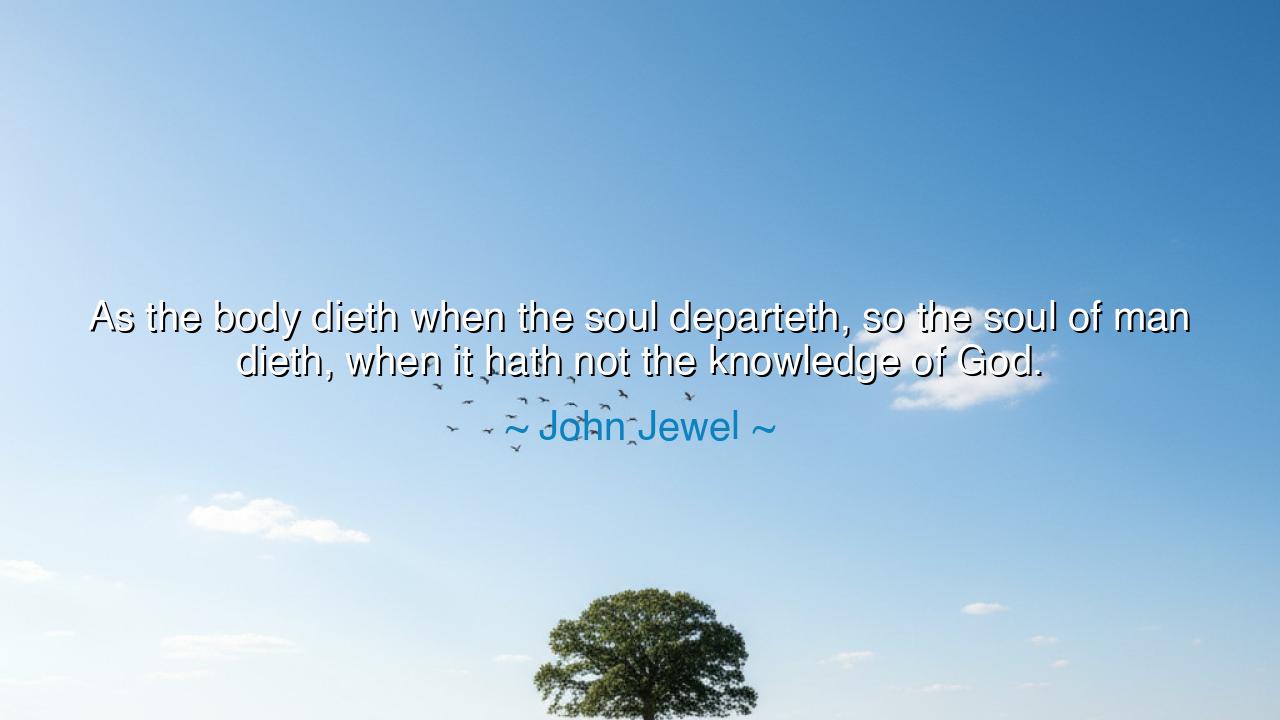
As the body dieth when the soul departeth, so the soul of man
As the body dieth when the soul departeth, so the soul of man dieth, when it hath not the knowledge of God.






In the solemn words of John Jewel, the great English theologian of the Reformation, we encounter a truth that pierces through centuries of spiritual thought: “As the body dieth when the soul departeth, so the soul of man dieth, when it hath not the knowledge of God.” Here, Jewel draws a mirror between the mortal and the eternal — between the flesh that withers without breath, and the spirit that decays without truth. His words are not mere doctrine; they are a cry from the heart of a man who saw in ignorance the greatest form of death. For Jewel understood that life is not sustained by blood alone, but by knowledge — the knowledge of the Divine, which nourishes the soul as surely as air sustains the lungs.
To grasp the depth of this statement, we must remember the age in which he spoke. The sixteenth century was a time of great upheaval — the Reformation, when Europe’s faith trembled under the weight of revelation and rebellion. John Jewel, Bishop of Salisbury, stood as one of the defenders of the emerging Protestant faith. In his writings and sermons, he sought to awaken the people to a living relationship with God, not one mediated solely through ritual or tradition, but through understanding, through the direct knowledge of the Creator. Thus, his words were both a warning and a call to awakening. Just as the body collapses when the soul leaves it, so too does the spirit of humanity wither when cut off from divine wisdom. Without God, man walks — but as a shadow walks, without light or direction.
The meaning of Jewel’s words reaches far beyond theology; it touches the essence of what it means to live as a conscious being. The knowledge of God here is not mere scholarship or doctrine — it is awareness of truth, beauty, and moral order. It is the light of wisdom that gives purpose to existence. For just as a lamp without oil flickers into darkness, the human soul without knowledge of the divine loses its flame. It may still move, still speak, still hunger and desire, but it is as one adrift, severed from its source. The ancients called this the “second death” — the death not of the body, but of the spirit that forgets who it is and from whence it came.
Consider the story of Tolstoy, centuries after Jewel, who at the height of his fame and fortune found himself haunted by despair. He had health, wealth, and glory — yet he confessed that life felt hollow, “a meaningless absurdity.” Only when he turned inward, seeking the eternal, did his soul begin to revive. In rediscovering the divine, he rediscovered himself. This story embodies the very truth Jewel proclaimed: that man may have the world and still be dead within if he does not know the source of being, the eternal presence that gives meaning to every breath.
There is also a fierce moral power in Jewel’s vision. For if the soul dies without the knowledge of God, then ignorance becomes not an accident, but a tragedy. He speaks not of intellectual ignorance, but of spiritual blindness — the refusal to see the divine pattern that weaves through all creation. A society that forgets God, he warns, becomes a body without a soul — active, ambitious, and yet hollow. Its works lose direction, its art loses beauty, its justice loses mercy. History has shown this truth again and again: empires that rise on pride and power, without reverence for the sacred, collapse not from the sword, but from within. They die as a body dies when the soul departs.
The ancients, too, knew this wisdom. Plato spoke of the soul’s ascent toward truth, describing knowledge of the Good as the highest form of life. Saint Augustine echoed it when he wrote, “Thou hast made us for Thyself, O Lord, and our hearts are restless until they rest in Thee.” Jewel’s statement gathers these voices into one, proclaiming that to know God is to live fully, and to live without Him is to merely exist. It is a call to the mind and the heart alike — to seek not only information, but illumination; not only learning, but wisdom.
The lesson we may draw from Jewel’s words is both ancient and urgent: to nourish the soul as we nourish the body. In an age when knowledge abounds but wisdom is scarce, his message calls us back to the roots of being — to quiet reflection, prayer, and reverence for the eternal truths that sustain the spirit. Each of us must ask: what is the state of my soul? Am I alive in truth, or walking in shadow? For every life, however successful outwardly, will wither if the inner flame of faith goes dark.
And so, dear listener, remember this: the body perishes without breath, and the soul without light. Seek, then, the knowledge of God, not as dogma, but as living understanding — a union of the heart with the Infinite. Feed your mind with learning, but feed your spirit with wisdom. Let the two walk together as body and soul, and your life will not merely endure — it will shine, radiant with the light of truth that death cannot extinguish.






AAdministratorAdministrator
Welcome, honored guests. Please leave a comment, we will respond soon